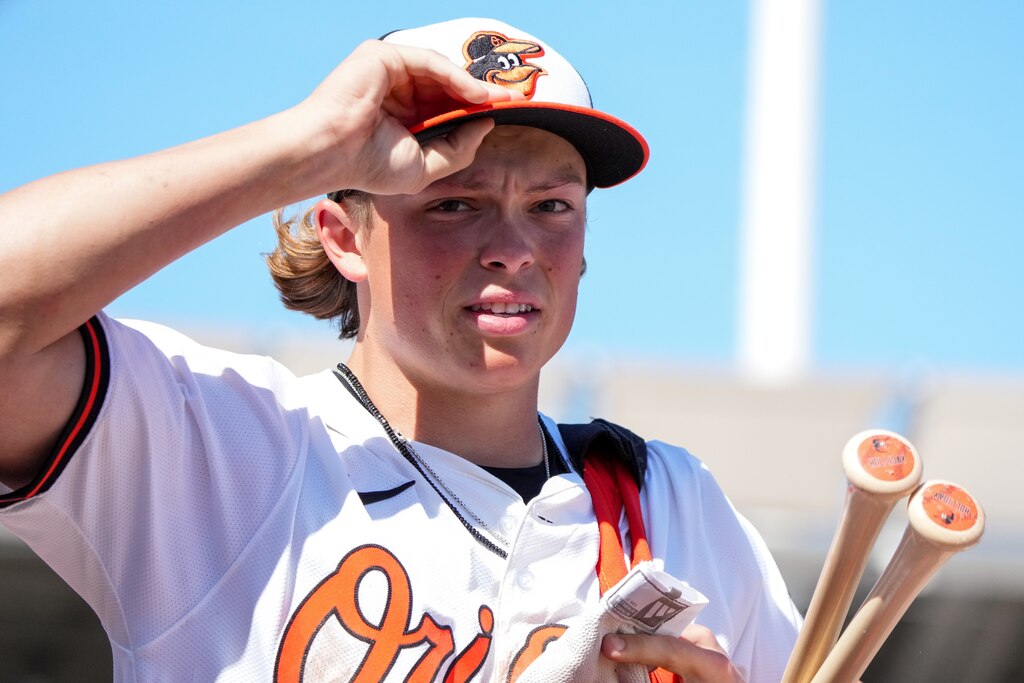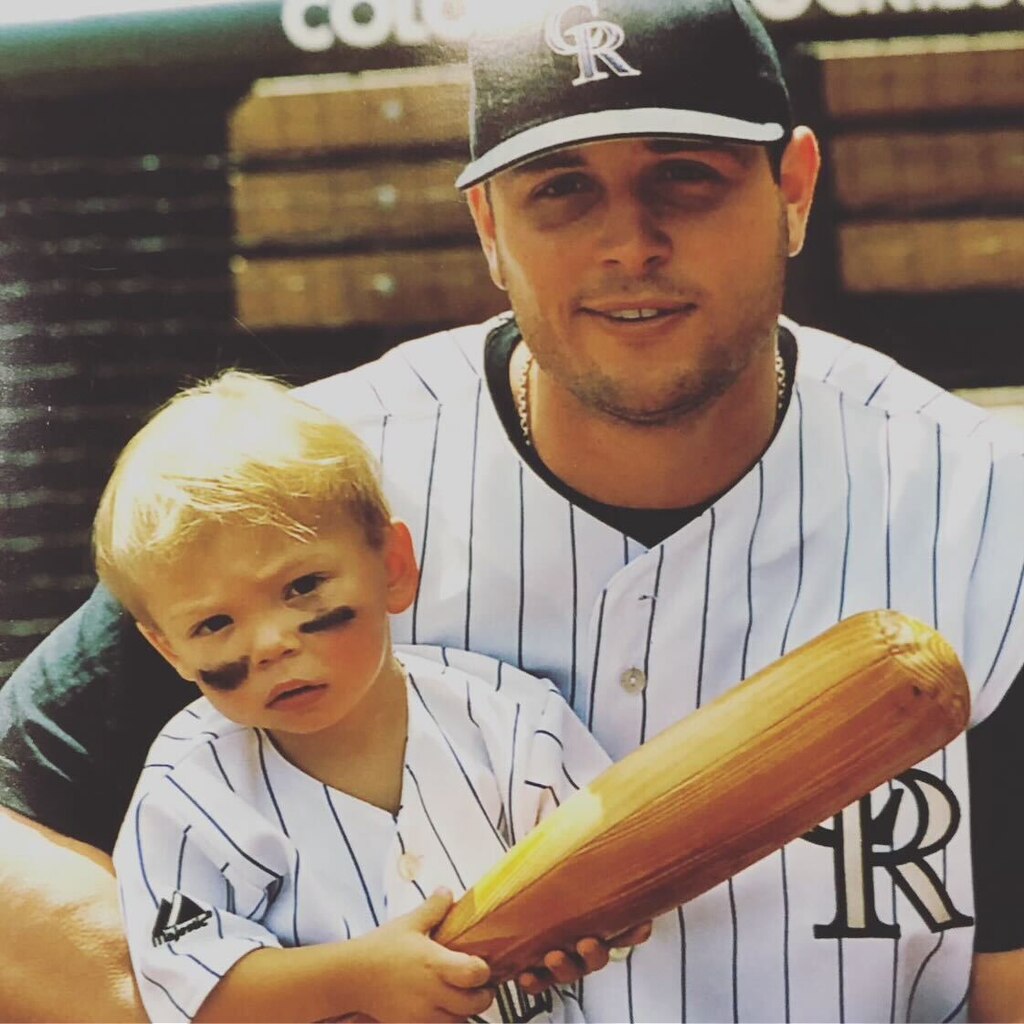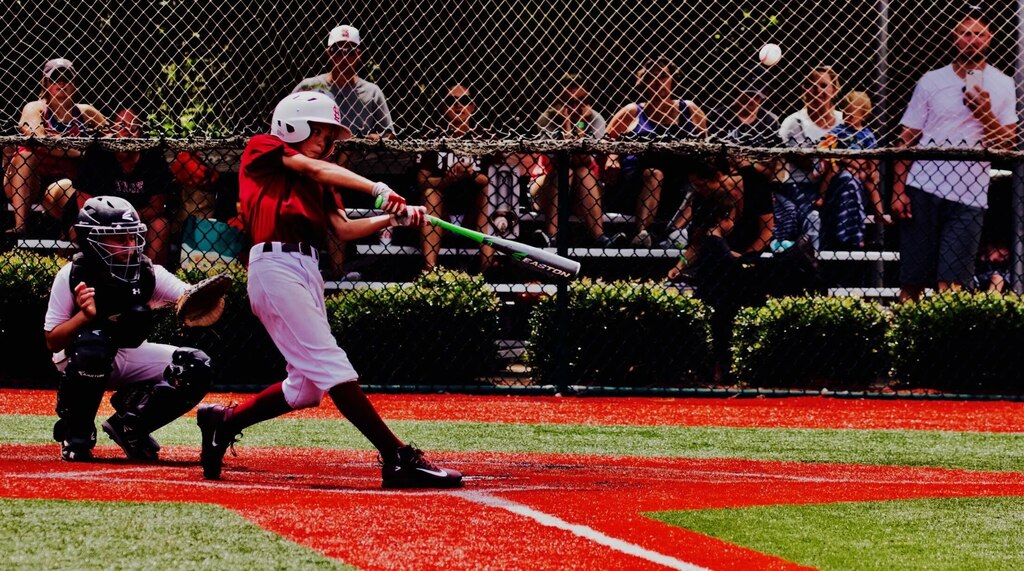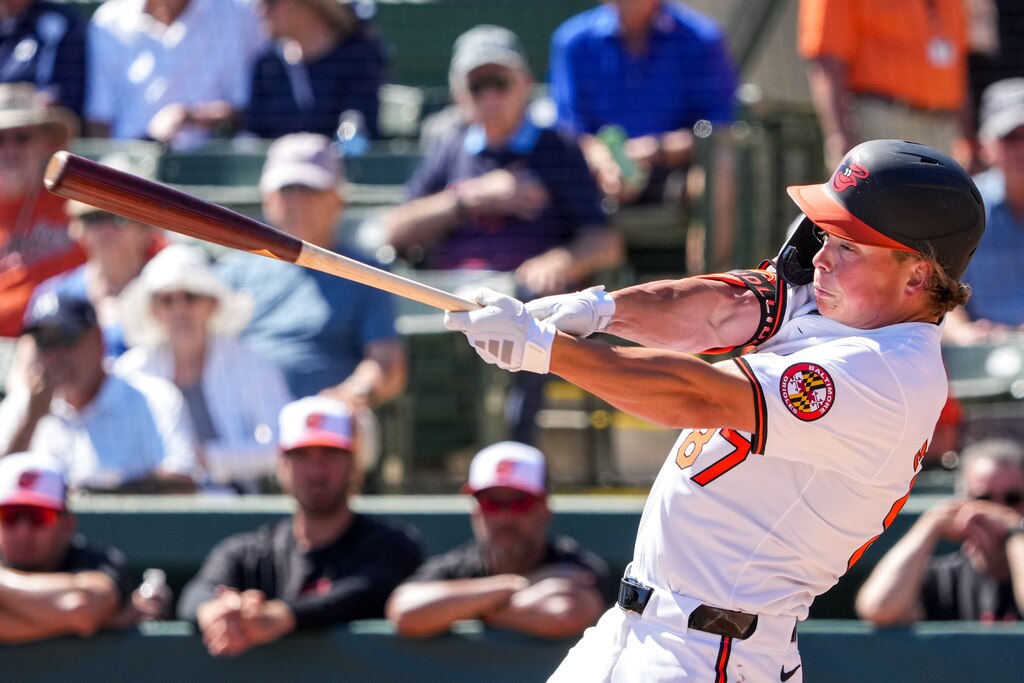Jackson Holliday is not one to let go or admit defeat, so even as chaos roared around him, the 20-year-old hung on tightly.
He stood up within the small watercraft that pitched back and forth on the otherwise tranquil winter pond in Stillwater, Oklahoma, to leverage himself for his latest duel. Usually, his battles take place during an at-bat, when he locks eyes with a pitcher and tries to get the best of him.
This time it’s a fish. A big one.
Holliday, meanwhile, is on a small boat. With two other grown men.
The Baltimore Banner thanks its sponsors. Become one.
“It’s like us on a paddleboard, basically,” said Victor Romero, a close friend of Holliday’s. Romero couldn’t help but holler while Holliday grappled with his fishing pole. Jackson’s father, Matt Holliday, uses his 6-foot-4 frame to spread out and keep the boat from flipping.
“Every single move,” Romero said, “you feel like you’re about to tip over.”
Read More
Yet they’ve never been forced into an unexpected swim, and they won’t be on this day. The boat hits its crescendo of turbulence and Jackson Holliday yanks the fish aboard. There are smiles and high-fives. It’s not raucous, though, because Holliday expects this of himself — in the same way he expects to reach base against a high-end pitcher.
This is Holliday’s life when out of the spotlight. When he has a bat in his hand, the camera lens follows him everywhere, from The Barn built on his family’s property to the Ed Smith Stadium complex in Sarasota, Florida, where he’s pushing for a roster spot with the Orioles less than two years after they selected him first overall in the draft.
Away from it all, he’s an unassuming kid with a fishing rod or a golf club or a pickleball paddle in hand. But his demeanor — and origin story — might conceal the drive that has taken him this far.
The Baltimore Banner thanks its sponsors. Become one.
For an aspiring big leaguer, there are few environments that could be more beneficial than growing up with a seven-time All-Star for a father. The genes, the opportunities, the training regimen — there’s a leg up, for sure. But Holliday is different, those close to him say, not least of all for how hard he works. He’s different because of the cool confidence that never overflows into cockiness, because of the quiet demeanor, because of the blush that rises to his cheeks when he’s the center of attention.

He is the center of attention, of course. He became the No. 1 prospect in baseball at age 19 and, having only recently turned 20, Holliday is hitting .326 with a .998 on-base-plus slugging percentage this spring.
Within the Orioles clubhouse at the Ed Smith Stadium complex, Holliday seems at ease despite the fact he’s the youngest player there. He doesn’t take a leading role in banter but will chime in from time to time. He sits at his locker, relaxed, because “this is kind of normal for me, I guess,” Holliday admitted. “This is what we used to do.”
“I try to put myself in his shoes,” said Jordan Westburg, an infielder five years Holliday’s senior. “If I was 20 years old and in a big league clubhouse, I’d be in a corner not talking to anybody. He is a little quiet, but he’s interacting with people; he’s talking to veterans.”
Last year, catcher James McCann put it this way: “He looks 12 in the face and acts like a 40-year-old veteran.”
The Baltimore Banner thanks its sponsors. Become one.
Holliday can act the same way on a skiff as he does in baseball — not saying much, then springing into action once competition commences.
Under the surface, there’s a bubbling desire to reach the highest level. Holliday grew up in major league clubhouses, around major league players. He has spent the greater part of his two decades striving to return to these promised lands on his own terms.
And here he is, on the doorstep, not bothering to knock when his bat has long signaled his coming.
His only plan
They all matched: Matt, Jackson and Ethan Holliday. Onto the plane they’d go in suits, business attire for a business trip, from one ballpark to the next. Summer vacations for Jackson and Ethan Holliday, hardly older than toddlers, meant going to work with Dad.
Which meant following a major league team throughout the summer.
The Baltimore Banner thanks its sponsors. Become one.
“It’s pretty much what we’ve been doing for as long as I can remember,” Holliday said.
With the Colorado Rockies and, later, the St. Louis Cardinals, the Holliday boys fell in love with the grind of a baseball season. For many of their formative years, until their own baseball careers took off as early teenagers, they’d follow their dad to the stadium in the early afternoon, change into baseball attire and hit the field.

While Matt Holliday underwent his own pregame routine, so too did his sons, shagging fly balls in the outfield or hitting grounders to each other. And, when their dad finished his own warmups, he’d take his boys into the cage and throw a round of batting practice.
After the game, they’d change and head back to the hotel, order room service and then fall asleep, ready to do it all over again.
“There were times like that you really savor and remember,” Matt Holliday said. “It was a real joy and a real blessing to have them around so much. I think it probably allowed me to play a few years longer just knowing that they were around and the teams that I was with allowed them to have full access.”
The Baltimore Banner thanks its sponsors. Become one.
Matt Holliday didn’t want to push his sons in any particular direction. They saw the baseball life and they loved it — or he wouldn’t have kept bringing them to the field.
Jackson Holliday looked at home there. Even at an early age, Holliday poured hours into building his skills. Pregame routines were some of his favorite parts of the day, when his dad’s teammates or coaches would hit grounders to him between their own sets. Baseball was his calling.
“I really never thought he’d do anything else, to be honest with you,” Matt Holliday said. “From such a young age, how skilled he was and how much he loved to play and be at the field, I never had to worry about whether they were bored or what they were up to, because they were just playing at the ballpark like kids.”
By the time Jackson turned 10, his team’s losses spurred him to evaluate the lineup cards. Jackson would tell his dad all about why moving one of his teammates in the order would prove beneficial for the youth league team — He walks a lot, Jackson would say, and if he gets on base in front of me, I could drive him home.
Jackson Holliday figures he picked up that trait from his grandpa or his uncle, who are both coaches. His uncle, Josh, leads Oklahoma State; Tom Holliday spent 40 straight seasons as an assistant or head coach at Division I programs, during which his teams made 17 College World Series appearances.
The Baltimore Banner thanks its sponsors. Become one.
Baseball was destined to be part of Jackson Holliday’s life. It was his choice to make it his whole life.
“I wasn’t exactly good at school, ever. I knew that this was what I wanted to do for a long time,” Holliday said. “I told everyone during draft interviews, I had no Plan B. My only plan was to play baseball.”
Earning his way
Johnny Goodrich didn’t know how this would go.
Onto the field walked Jackson Holliday, a 15-year-old preparing to play for the 16-year-old age group Orlando Scorpions, a prominent travel baseball club. Holliday was the smallest kid there, a wiry teen who kept his head down. He didn’t talk much. He was in Hoover, Alabama, joining ranks with the Scorpions for a tournament because the team needed an additional middle infielder.
“At the time, he didn’t necessarily pass the eye test, if that makes sense,” said Goodrich, who coaches the Scorpions. “It’s kind of like, ‘Man, I expect him to be bigger, I expect him to be stronger. I expect this, I expect that.’”
And then Goodrich watched Holliday play.
The Scorpions faced a left-hander throwing in the low 90s who was taken with a high draft pick the next year, and the southpaw rolled through their lineup. Holliday, though?
“You blink your eye, we lose the game, but you look up and Jackson was 4-for-4 with two doubles,” Goodrich recalled. “And it’s like, wow. Everybody else had kind of a rough day except for this guy.”
In the next game, the Scorpions faced a right-hander with a wipeout slider and a fastball that hummed at around 95 mph. The Scorpions won, but it was a struggle.
“Here’s Jackson with another 3-for-3 day,” Goodrich said. “And it’s like, ‘This guy is pretty frickin’ special.’”
Goodrich had met Holliday a year earlier, during another tryout with the Scorpions — one that didn’t go quite as well. Again, Holliday was trying to play up an age group. He wanted the challenge against bigger, stronger players. Goodrich saw potential, the efficient movements and the clean bat path. But the lack of arm strength and power kept him from making the team.
It was only a matter of time before Holliday grew; in the meantime, he refined other areas of his game.
“Learning how to be a good player undersized,” Holliday said, “helped me in the long run once I got stronger.”

His understanding of the strike zone, even as a 14-year-old, was sublime. He didn’t overswing to compensate for what he lacked in power. Instead, he barreled baseballs up the middle and the other way, staying through the ball in a way that seemed beyond his years. In the field, he made up for lesser arm strength through anticipation and study. He knew where the ball would be hit, it seemed, before it even left the bat.
From all those years watching the major leagues, Holliday understood the game at the highest level.
“His swing has always been the same,” said Romero, an assistant coach at Oklahoma State. “I have videos from early on, I have videos from 14, I have videos from now. His swing, his path, his leg kick, all that has been the same. He’s just been grooming that swing forever.”
What surprised Goodrich was not so much Holliday’s talent and polish but how he carried himself: like he was a kid striving for a spot, instead of the son of a National League batting champion. There is no entitlement, and certainly no hubris, from a phenom who could be excused from exhibiting an ego.
During his final summer league game for the Scorpions about two years ago, Holliday took what seemed to be an obvious ball. Strike, the umpire called. Holliday took the next pitch — even more high and outside, practically in the other batter’s box — and the same call was made. Strike.
At best, the umpire had a long day and missed two clear calls. At worst, he was showing up the future top pick.
Holliday may have shaken his head. He certainly didn’t cuss — in the three years Goodrich coached Holliday, he never heard the player curse — but the umpire laid into Holliday anyway.
Out walked Goodrich, pulling Holliday aside.
“That’s definitely the shortest game that I’ve ever managed,” he joked. Goodrich lasted one-third of an inning before he was tossed. He fought the battle for Holliday because he knew Holliday would swallow his tongue and take it.
It’s so different from other big-time players Goodrich has coached — and he’s coached more than a few future major leaguers.
“The successful guys I’ve been around, the play is big but so is the ego,” Goodrich said. “Those things tend to go hand in hand. The one thing you can never accuse Jackson of is being egotistical. The humility he has — that’s the word. I’ve never met a young man with his humility.”
‘His path in baseball is different’

There’s no way that’s a hit in a real game, Jackson Holliday will say.
It’s a common line from the 20-year-old, incredulous that the Rapsodo hit tracking system inside their batting cage indicated the ball off his younger brother Ethan’s bat would find grass. Maybe in high school it does, but Holliday pushes his brother in these cage sessions, because he knows Ethan, too, has the potential to reach the big leagues. He’s Baseball America’s top-ranked high school player in the 2025 class, preparing to continue a family legacy in the sport.
“That thing can be really wrong sometimes,” Holliday said, admitting that more than a few arguments stem from the Rapsodo machine’s judgment. “It frustrates me.”
They’ll bicker back and forth. But they always go back to what the Rapsodo said, taking the technology’s word on whether it was a double or a lineout. The result of each swing matters, because they aren’t just swinging for the heck of it.
Ethan and Jackson Holliday enter the cage most days trying to outdo the other. Sometimes they see who can record the highest exit velocity (Matt Holliday still has them beaten, reaching 114 mph with a metal bat recently). Other times, their dad will throw mixed batting practice (meaning he’s moving the ball and throwing breaking pitches, not just piping the ball down the middle) playing four mock innings — when one player reaches three outs, per the Rapsodo’s judgment, they switch.
“I’ve always tried to push Ethan, because he’s super, ultra-talented,” Jackson Holliday said. “It’s pretty fun. It’s probably the most competitive thing he’ll do until he gets to minor league baseball; the high school season will probably be pretty easy for him.”
That competitive training environment has elevated Holliday; each day there’s a game to be won. Romero helps Holliday through his early sessions, beginning with pickleball and continuing through a series of timing drills. Holliday leads himself, mostly. He knows what he needs.
But just about every day ends with Romero or Matt Holliday trying to get Jackson Holliday out in a mock-game situation.
“Those are the fun days for us,” Romero said. “We get on the machine and face foam balls, and we try to strike him out. Or his dad and I, we’re throwing mixed BP to him, where we’re throwing curveballs, changeups, cutters — we’re trying to make up random pitches to strike him out.”
Those hard-core batting practice sessions through the years prepared Holliday for the minor leagues. He roared through the levels as a 19-year-old in his first full season in professional ball. He hit .396 at Low-A Delmarva in 14 games, then posted a .314 average at High-A Aberdeen. After 57 games there, Holliday jumped to Double-A Bowie. He recorded a .338 average for the Baysox, and it took only 36 games before Holliday wound up in Triple-A.
Holliday will admit he was somewhat surprised by how well he did so soon. So was Aidan Meola, who plays at Oklahoma State and is Holliday’s good friend, because he knows how huge the gap in talent is between high school and professional ball.
But to Romero the rapid rise that has led Holliday to the edge of the major leagues came as no surprise. He’s seen the work ethic up close since Holliday was 14. He’s seen the hitting prowess and defensive instincts.
“I know that his path in baseball is different,” Romero said. “He’s just that kind of player.”
Every few weeks, Holliday would text his dad and Romero in their group chat, with news of another promotion.
Are you ready? they’d ask.
“I don’t know how much more I can be ready,” Holliday replied. “I’m just going to keep doing the same thing I’m doing.”
‘Dude, you’re jacked’
In that group chat among Romero, Matt Holliday and Jackson Holliday, Jackson sent videos of two swings: One from last year’s spring training and one from this year.
It wasn’t the swing any of them focused on — that is the same as it always has been. Instead, it was Holliday’s forearms.
“We both just said, ‘Dude, you’re jacked. You look bigger. You look like an adult now,’” Romero recalled.
If there was one thing Holliday realized he needed to improve between 2023 and 2024, it was his strength. He overcame his small size when playing for the Scorpions, relying on his line-drive swing. He overcame it in the minor leagues, too, with superior bat-to-ball skills making up for a lack of power.
But, to make the jump to the majors, Holliday only had to look around at the other prospects who reached the highest level. They were bigger, plain and simple. They were stronger.
“He looked at himself and said, ‘You know what? If I want to play in the major leagues, I need to gain a little bit of muscle and probably put on 10 pounds,’” Matt Holliday said. “He attacks his weaknesses really well.”

The plan worked.
“Every time I see him when he gets back home,” Meola said, “it looks like he’s 20 pounds bigger than when I last saw him.”
When Holliday walked into the clubhouse at the Ed Smith Stadium complex this spring, he turned heads. His face is youthful, but he’s no longer the undersized teenager who needed to swing to impress. Now, there’s an anticipation to his plate appearances, an expectation that he’ll drive a double to the wall at 104.4 mph, as he did recently against Philadelphia Phillies ace Zack Wheeler.
In the batting cages, Westburg is often in Holliday’s group of six to eight players. He doesn’t always watch Holliday closely — he has his own work to do — but Westburg has noticed a “striking resemblance” between Holliday and Gunnar Henderson, another infield phenom who’s coming off the AL Rookie of the Year Award.
They’re hardworking players who don’t say much. They’re quiet — that is, until they swing. Westburg can tell which cage Holliday is using based on the sound alone.
“Just barrels,” Westburg said. “And barrels and barrels and barrels.”
The eyes of baseball are upon Holliday. The game’s top prospect, he’s a constant talking point. With that comes pressure. Adley Rutschman felt it. Henderson felt it. Holliday, though, appears unmoved by it all, as if this is normal.
But almost nothing about Holliday is really normal — neither the swing nor the composure as a 20-year-old to handle this push for a major league roster spot on a team coming off an American League East title.
Back on the water, in that little fishing boat, Romero and Holliday casted their lines and talked just before Holliday reported to camp. Was he ready? Was Holliday capable of winning and maintaining a place on an Orioles club aspiring for a championship?
Just do your thing, Romero told him.
Holliday, after all, was born into this life.
Now he’s on the verge of the major league debut he has envisioned since he was old enough to run, swing a bat and dream of being a ballplayer.





Comments
Welcome to The Banner's subscriber-only commenting community. Please review our community guidelines.